Tuesday, 6 August 2013 (The Walnut Room, Denver CO)
After listening to Vieux Farka Touré's new album, Mon Pays (read my review on Spectrum Culture), I was excited to catch him live and I was lucky enough to see him at the Walnut Room. It was a perfect venue: small enough to be intimate, but room enough to surrender to the rhythm and dance.
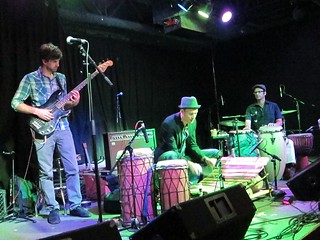
Before the show, I spent some time talking to singer Venus Cruz from the New World Citizen Band. Aside from finding out that she hosts the "Jazz Odyssey" show on Denver's KUVO, it was clear that she and her bandmates were well grounded in African music. The lineup is a subset of the Greg Harris Vibe Quintet, but for this group, bandleader Harris centers their sound on his Ghanaian wood xylophone, the gyil.
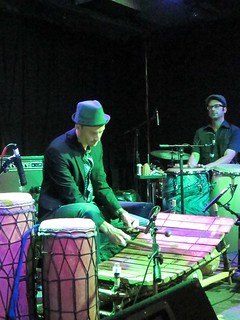
The gyil has a very distinct character. Calabash gourds act as resonators for the wooden keys, but the gourds have a kind of membrane that buzzes, giving the instrument a hybrid sitar/steel drum sound. Even though Harris built up some interesting melodies on the gyil and his amplified kalimba, their songs formed a study in polyrhythms and interlocking parts.
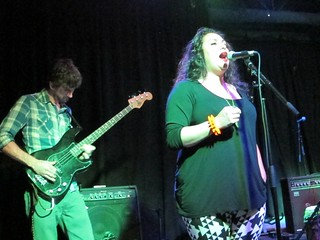
The set opened with echoing kalimba and a relaxed groove that felt like a Dreamtime exploration. With fellow percussionist Ido Ziv and bass player John Grigsby, Harris let the instrumental flow casually build complexity. Eventually, Grigsby's bass slid into a repetitive, twisting pattern that snaked through the competing percussion parts. It felt very heady until Cruz stepped in and grounded the song with her powerful vocals. Her contribution was particularly strong a few songs later on "Baby, Don't Do That To Me".
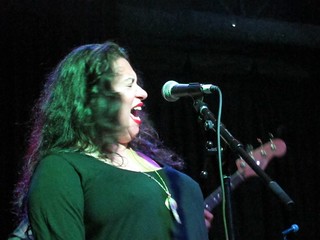
She gave the song a righteous Motown vibe, passing from sassy to deeply soulful as she improvised her way through the lyrics. But the arrangement got its global feel by trading guitars, keys, or horns for interplay between the bass and the gyil. The surprise turn came after Ziv's conga solo, when the song sped into double time.
The New World Citizen Band was a good opening act for Vieux Farka Touré. They offered a taste of Africa and got the audience ready to move.
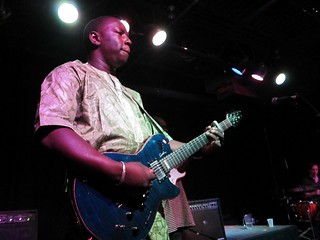
On Mon Pays, Vieux Farka Touré paid homage to Mali's musical tradition and his father's characteristic sound. Just as Ali Farka Touré played with kora player Toumani Diabaté, their two sons teamed up in the studio, with Sidiki Diabaté on kora. The tour, however, relied on a minimalist line up with Touré accompanied by a bass player and a drummer/percussionist. While I was disappointed that I wouldn't get to hear the Asian-tinged tones of the kora, it faded quickly as I became entranced by Touré's playing.
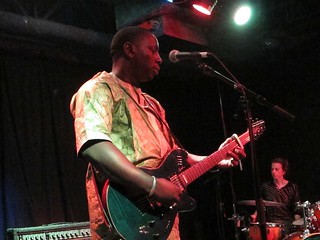
The first tune had the drummer playing a simple beat on large, resonant calabash with thin metal sticks: imagine someone playing a half globe with long Allen wrenches. Then Touré started a hypnotic melody line, full of floating trills. Eyes closed, he fell under his own spell as the groove swayed and swelled. Without a larger band contributing complexity, it was much easier to hear how the guitar and bass coordinated their parts. On the second song, he set up a simple, folky blues progression, then filled the holes with fluid runs as the bass line trailed along, shadowing his riffs.
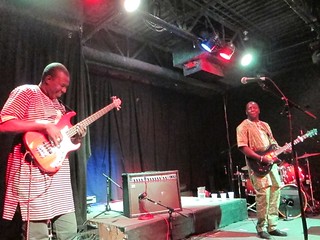
As much as I enjoyed Mon Pays, I realized that Touré is much more engaging in person. His playing was wilder as he fed off the crowd's energy. His lightning hammer-on/pull-off runs blended bluegrass with speed metal. Watching closely, I saw that his technique was sometimes similar to a clawhammer banjo style. Alternatively, he could execute phenomenal tonal control by alternating between muted, bare-finger attacks and ringing finger pick strikes. One of the best tunes of the night, "All The Same", had a chord structure somewhere between "Hey Joe" and Bob Seger's "Turn The Page". Touré started out the song with soulful, downtempo feel. Then, switching between soft and sharp riffs, he set up a guitar conversation with himself until it the song rose to a transcendent affirmation. He played like Jimi Hendrix, intense and expressive with a natural sense of harmony, but without playing a single Hendrix riff.
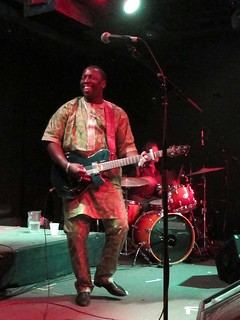
Although he didn't provide much in the way of patter, his personality shined. Trading an amused glance with the bass player, Touré might start to dance, then challenge the bassist to join in. At other times, he'd screw up his face, lost in the emotion of the song. Most of his comments were in a mix of French and English. In particular, he wanted us to join in with the rhythm of the music. The peak moment came when the show transformed into a dance party, with members of the audience coming up on stage to show off their moves while Touré smiled on.
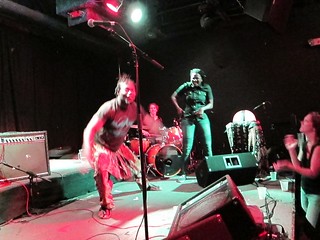
After the show, sitting at the back of the room signing CDs and collecting donations for Mali, he seemed as thankful for an attentive audience as we were for his music.
More photos on my Flickr.
After listening to Vieux Farka Touré's new album, Mon Pays (read my review on Spectrum Culture), I was excited to catch him live and I was lucky enough to see him at the Walnut Room. It was a perfect venue: small enough to be intimate, but room enough to surrender to the rhythm and dance.
New World Citizen Band

Before the show, I spent some time talking to singer Venus Cruz from the New World Citizen Band. Aside from finding out that she hosts the "Jazz Odyssey" show on Denver's KUVO, it was clear that she and her bandmates were well grounded in African music. The lineup is a subset of the Greg Harris Vibe Quintet, but for this group, bandleader Harris centers their sound on his Ghanaian wood xylophone, the gyil.

The gyil has a very distinct character. Calabash gourds act as resonators for the wooden keys, but the gourds have a kind of membrane that buzzes, giving the instrument a hybrid sitar/steel drum sound. Even though Harris built up some interesting melodies on the gyil and his amplified kalimba, their songs formed a study in polyrhythms and interlocking parts.

The set opened with echoing kalimba and a relaxed groove that felt like a Dreamtime exploration. With fellow percussionist Ido Ziv and bass player John Grigsby, Harris let the instrumental flow casually build complexity. Eventually, Grigsby's bass slid into a repetitive, twisting pattern that snaked through the competing percussion parts. It felt very heady until Cruz stepped in and grounded the song with her powerful vocals. Her contribution was particularly strong a few songs later on "Baby, Don't Do That To Me".

She gave the song a righteous Motown vibe, passing from sassy to deeply soulful as she improvised her way through the lyrics. But the arrangement got its global feel by trading guitars, keys, or horns for interplay between the bass and the gyil. The surprise turn came after Ziv's conga solo, when the song sped into double time.
The New World Citizen Band was a good opening act for Vieux Farka Touré. They offered a taste of Africa and got the audience ready to move.

On Mon Pays, Vieux Farka Touré paid homage to Mali's musical tradition and his father's characteristic sound. Just as Ali Farka Touré played with kora player Toumani Diabaté, their two sons teamed up in the studio, with Sidiki Diabaté on kora. The tour, however, relied on a minimalist line up with Touré accompanied by a bass player and a drummer/percussionist. While I was disappointed that I wouldn't get to hear the Asian-tinged tones of the kora, it faded quickly as I became entranced by Touré's playing.

The first tune had the drummer playing a simple beat on large, resonant calabash with thin metal sticks: imagine someone playing a half globe with long Allen wrenches. Then Touré started a hypnotic melody line, full of floating trills. Eyes closed, he fell under his own spell as the groove swayed and swelled. Without a larger band contributing complexity, it was much easier to hear how the guitar and bass coordinated their parts. On the second song, he set up a simple, folky blues progression, then filled the holes with fluid runs as the bass line trailed along, shadowing his riffs.

As much as I enjoyed Mon Pays, I realized that Touré is much more engaging in person. His playing was wilder as he fed off the crowd's energy. His lightning hammer-on/pull-off runs blended bluegrass with speed metal. Watching closely, I saw that his technique was sometimes similar to a clawhammer banjo style. Alternatively, he could execute phenomenal tonal control by alternating between muted, bare-finger attacks and ringing finger pick strikes. One of the best tunes of the night, "All The Same", had a chord structure somewhere between "Hey Joe" and Bob Seger's "Turn The Page". Touré started out the song with soulful, downtempo feel. Then, switching between soft and sharp riffs, he set up a guitar conversation with himself until it the song rose to a transcendent affirmation. He played like Jimi Hendrix, intense and expressive with a natural sense of harmony, but without playing a single Hendrix riff.

Although he didn't provide much in the way of patter, his personality shined. Trading an amused glance with the bass player, Touré might start to dance, then challenge the bassist to join in. At other times, he'd screw up his face, lost in the emotion of the song. Most of his comments were in a mix of French and English. In particular, he wanted us to join in with the rhythm of the music. The peak moment came when the show transformed into a dance party, with members of the audience coming up on stage to show off their moves while Touré smiled on.

After the show, sitting at the back of the room signing CDs and collecting donations for Mali, he seemed as thankful for an attentive audience as we were for his music.
More photos on my Flickr.

No comments:
Post a Comment